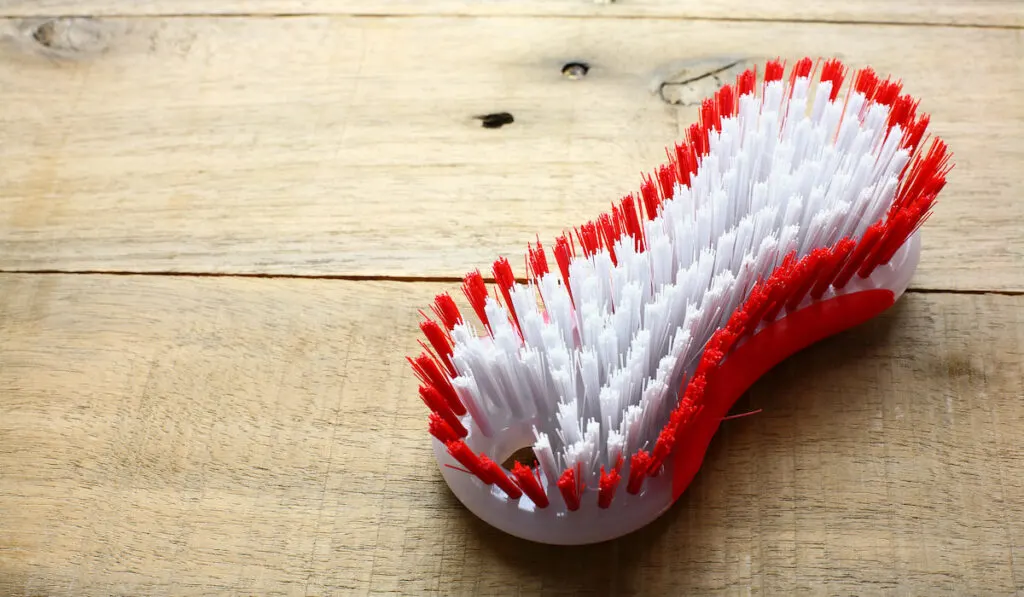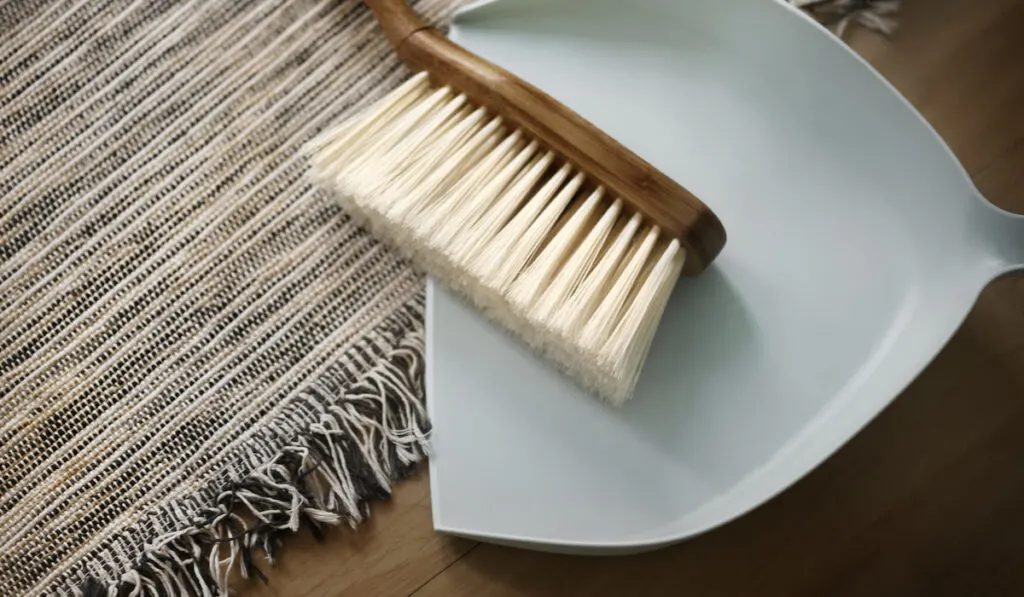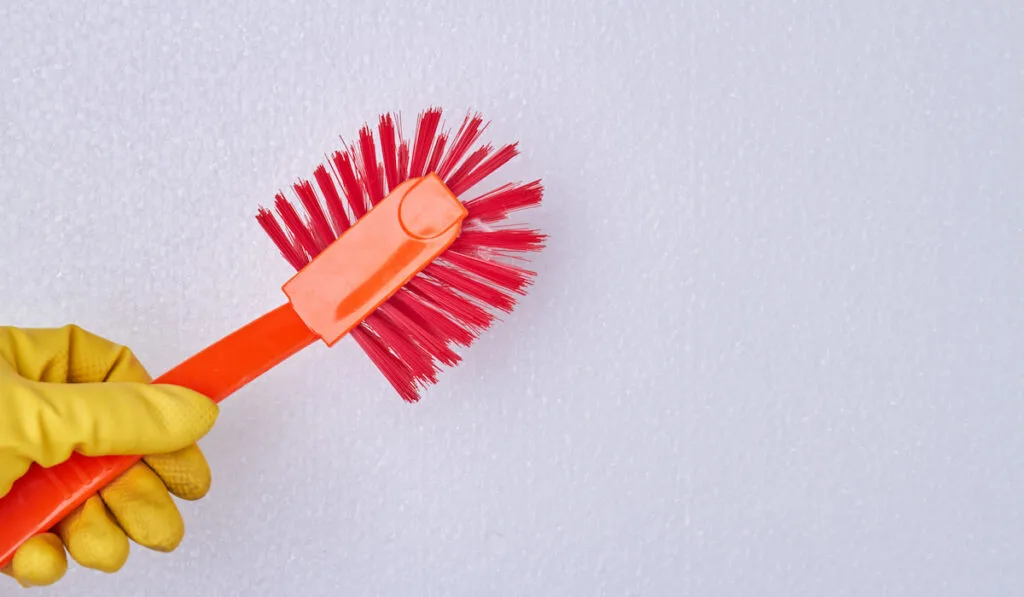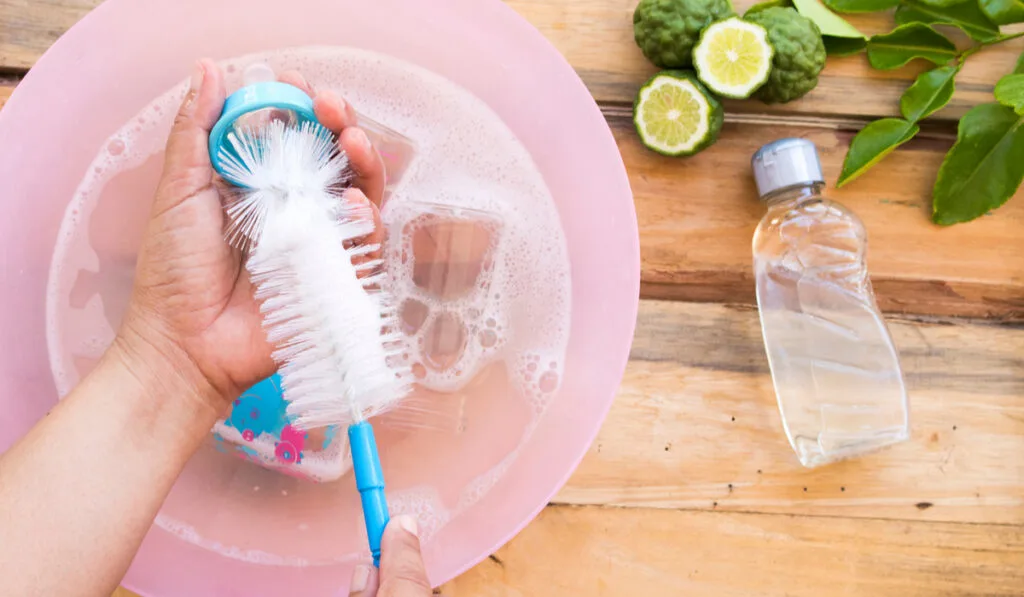Housekeeping can be a frustrating, dirty job, whether it’s your own home or you’re taking care of someone else’s. For most surface messes, paper towels or cleaning cloths are the best choices, but what about more stubborn messes?
There are 7 types of brushes used in house cleaning that can deal with any mess, large or small. The brushes are:
- Scrub brush
- Soft brush
- Carpet brush
- Floor brush
- Toilet brush
- Stove brush
- Bottle brush
Let’s have a closer look at these brushes and what they’re best suited to clean!
Table of Contents
Scrub Brush

- Bristle material: Natural or synthetic
- Size: Medium
- Uses: Bathtubs, sinks, large surface areas
Incredibly multipurpose, the scrub brush is the brush that comes to mind when you think of cleaning your house. Scrub brushes can be used to clean everything from floors to showers.
Scrub brushes have either a wooden or plastic handle, can be anywhere from palm-sized to a foot in length, and can be made from both natural and synthetic bristles. The bristles are packed close together to keep the brush stiff for when you need to scrub hard.
Scrub brushes can be used dry or wet, and with or without detergent. When dry, the bristles will be stiffer, but when cleaning stubborn stains or burnt-on food this can be desirable.
Soft Brush
- Bristle material: Synthetic or natural
- Size: Medium
- Uses: Dust, delicate surfaces
Soft brushes are nearly identical to scrub brushes except for their bristles. Instead of stiff, tightly packed bristles, soft brushes have more spread apart, softer bristles for more delicate tasks.
Soft brushes are great for cleaning dirt off of fabric shoes or for dusting off debris from a glass stovetop.
Carpet Brush

- Bristle material: Rubber
- Size: Large
- Uses: Carpet, sweeping
Carpet brushes are long and thin and are attached to a handle like a typical broom. Carpet brooms are used to clean debris from carpets when a vacuum isn’t available, and also to sweep hardwood and tile floors.
The rubber bristles, also known as fingers, can dig deeply into the carpet and trap the hair, dirt, and other detritus stuck within. They are typically used in short, quick strokes for the best effect.
When using on surfaces that aren’t carpet, carpet brushes can even assist in cleaning up wet spills, and the brush head is easily rinsed out since it is made of waterproof rubber.
Floor Brush
- Bristle material: Synthetic
- Size: Large
- Uses: Deck scrubbing, sweeping
A floor brush , also known as a deck brush, is typically used to scrub tile floors in combination with soap and water. Think of it as a more intense form of mopping. For set-in floor stains and dirty grout, you can’t beat a floor brush.
These brushes are often seen in restaurants and are used to clean the floors before closing time.
Toilet Brush

- Bristle material: Synthetic
- Size: Medium
- Uses: Toilet bowls
The name of this brush is pretty self-explanatory, and they’re the only single-use brush on our list. Toilet brushes should never be used anywhere but the toilet once used for the first time, and keeping them clean is incredibly important.
You might think that something you use to clean your toilet wouldn’t need to be kept sparkling clean since it’s just going back into the toilet bowl anyway, but a dirty toilet brush can lead to foul smells in your bathroom!
We recommend soaking your toilet brush in either a bleach-water solution or vinegar-water solution for regular cleaning and to kill any bacteria that could cause a stinky restroom if left unchecked.
Toilet brushes are medium-sized brushes with wooden or plastic handles that are cone-shaped or a looped oval. The handle is more than twice the size of the brush itself, providing ample room between your hand and the toilet.
Stove Brush
- Bristle material: Brass
- Size: Small
- Uses: Stoves, oven racks
Stove brushes are unique among the brushes on our list because instead of synthetic or natural bristles, their bristles are made from brass!
Such stiff, unforgiving bristles are necessary for this handheld brush because they are most often used to clean off cooked-on food and grease buildup, which are notoriously hard to clean substances.
Stove brushes can come with or without a handle, and will usually be seen in commercial restaurant settings, but don’t let this deter you from buying one yourself for your housekeeping! If you’ve got blackened over racks or a cookie sheet that just doesn’t seem to want to come clean, a stove brush may be the solution you’re looking for.
One thing to note is that we should never use these brushes on glass top stoves! They can easily scratch and damage the glass surface in just a few passes.
Bottle Brush

- Bristle material: Synthetic
- Size: Small
- Uses: Baby bottles, water bottles, tea kettles
Usually reserved for cleaning formula from hard-to-clean baby bottles, bottle brushes can also clean any deep item that you can’t reach by hand.
With metal and other types of reusable water bottles becoming so prevalent, it’s a good idea to have a bottle brush on hand to reach the bottom of them when washing. Bottle brushes are also particularly useful for items with small openings that need washing, like vases and thermoses.
If you’re actually using your bottle brush for baby bottles that previously contained formula, we recommend having a separate bottle brush for cleaning other items. When not cleaned immediately after use, any brush used to clean formula can have an unpleasant, lingering odor.
Bottle brushes are long and thin, and some have sponges on the tip. They always have a handle, usually made from a metal wire or hard plastic. It’s common for bottle brushes to have a suction cup on the end of them to keep them standing upright to dry.
In Conclusion
There isn’t just one housekeeping brush to assist you in cleaning, there are 7!
Some housekeeping jobs need a more specialized cleaning tool, and you’re sure to find what you’re looking for on our list.
